Related Research Articles
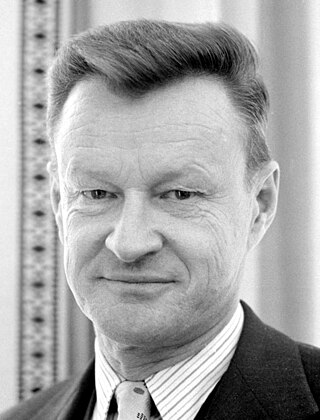
Zbigniew Kazimierz Brzeziński, or Zbig, was a Polish-American diplomat and political scientist. He served as a counselor to President Lyndon B. Johnson from 1966 to 1968 and was President Jimmy Carter's National Security Advisor from 1977 to 1981. As a scholar, Brzezinski belonged to the realist school of international relations, standing in the geopolitical tradition of Halford Mackinder and Nicholas J. Spykman, while elements of liberal idealism have also been identified in his outlook. Brzezinski was the primary organizer of The Trilateral Commission.
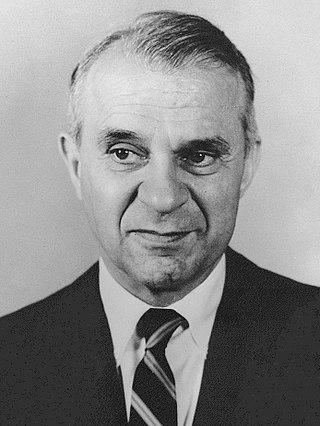
Wassily Wassilyevich Leontief, was a Soviet-American economist known for his research on input–output analysis and how changes in one economic sector may affect other sectors.
United States Objectives and Programs for National Security, better known as NSC 68, was a 66-page top secret National Security Council (NSC) policy paper drafted by the Department of State and Department of Defense and presented to President Harry S. Truman on 7 April 1950. It was one of the most important American policy statements of the Cold War. In the words of scholar Ernest R. May, NSC 68 "provided the blueprint for the militarization of the Cold War from 1950 to the collapse of the Soviet Union at the beginning of the 1990s." NSC 68 and its subsequent amplifications advocated a large expansion in the military budget of the United States, the development of a hydrogen bomb, and increased military aid to allies of the United States. It made the rollback of global Communist expansion a high priority. NSC 68 rejected the alternative policies of friendly détente and containment of the Soviet Union.
The Jackson–Vanik amendment to the Trade Act of 1974 is a 1974 provision in United States federal law intended to affect U.S. trade relations with countries with non-market economies that restrict freedom of Jewish emigration and other human rights. The amendment is contained in the Trade Act of 1974 which passed both houses of the United States Congress unanimously, and signed by President Gerald Ford into law, with the adopted amendment, on January 3, 1975. Over time, a number of countries were granted conditional normal trade relations subject to annual review, and a number of countries were liberated from the amendment.

Russian Public Opinion Research Center is a state-owned polling institution established in 1987, known as the All-Union Center for the Study of Public Opinion until 1992.

John Leonard Eatwell, Baron Eatwell, is a British economist who was President of Queens' College, Cambridge, from 1996 to 2020. A former senior advisor to the Labour Party, Lord Eatwell sat in the House of Lords as a non-affiliated peer from 2014 to 2020, before returning to the Labour bench.
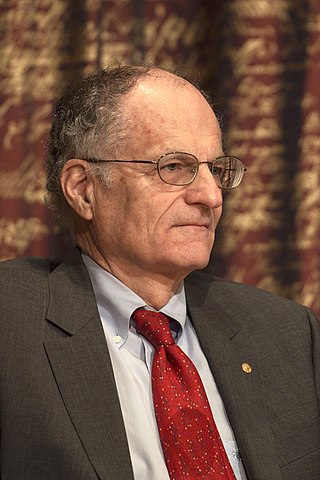
Thomas John Sargent is an American economist and the W.R. Berkley Professor of Economics and Business at New York University. He specializes in the fields of macroeconomics, monetary economics, and time series econometrics. As of 2020, he ranks as the 29th most cited economist in the world. He was awarded the Nobel Memorial Prize in Economics in 2011 together with Christopher A. Sims for their "empirical research on cause and effect in the macroeconomy".
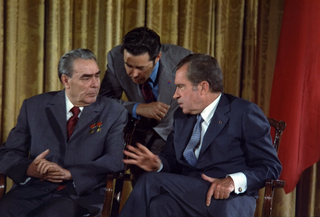
Linkage was a foreign policy that was pursued by the United States and championed by Richard Nixon and Henry Kissinger in the 1970s détente, during the Cold War. The policy aimed to persuade the Soviet Union to co-operate in restraining revolutions in the Third World in return for concessions in nuclear and economic fields. Soviet interventions occurred in various conflicts such as the Angolan Civil War, the Mozambican Civil War, and the Ogaden War, while many revolutions still occurred in Third World countries, undermining the policy.
Jerry Fincher Hough was an American political scientist. Hough was the James B. Duke Professor of Political Science at Duke University and his research focused on domestic American politics, the Soviet Union, the democratization of Russia, and American efforts at nation-building. Hough is a part of the "revisionist school" on Soviet history, maintaining that the level of terror was much exaggerated and that the Soviet Union was institutionally weak under Joseph Stalin, among other things. He saw the focus of his research and teaching as "the relationship of long term economic development and political institutions". In his final decade he focused on "the American experience in order to better understand the way that states, markets, and democracies develop and the way in which effective and stable ones can be created and maintained."

Aron Iosifovich Katsenelinboigen was a founder of predispositioning theory, a subject in decision theory and systems theory that models development in the context of uncertainty.
This bibliography of Richard Nixon includes publications by Richard Nixon, the 37th president of the United States, and books and scholarly articles about him and his policies.
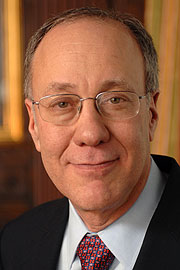
Roger Bruce Myerson is an American economist and professor at the University of Chicago. He holds the title of the David L. Pearson Distinguished Service Professor of Global Conflict Studies at The Pearson Institute for the Study and Resolution of Global Conflicts in the Harris School of Public Policy, the Griffin Department of Economics, and the college. Previously, he held the title The Glen A. Lloyd Distinguished Service Professor of Economics. In 2007, he was the winner of the Sveriges Riksbank Prize in Economic Sciences in Memory of Alfred Nobel with Leonid Hurwicz and Eric Maskin for "having laid the foundations of mechanism design theory." He was elected a Member of the American Philosophical Society in 2019.

Helmut Sonnenfeldt, also known as Hal Sonnenfeldt, was an American foreign policy expert. He was known as Kissinger’s Kissinger for his philosophical affinity with and influence on Henry A. Kissinger, the architect of American foreign policy in the Nixon and Ford administrations.
Gholam Reza Afkhami is an Iranian-born American scholar, author, educator, and a former Pahlavi Iran government official. He is the senior scholar and director of Social Science Research and International Studies at the Foundation for Iranian Studies. The Foundation for Iranian Studies is a Bethesda, Maryland-based research institution dedicated to the study of Iranian history, culture, economy and politics, created with the financial support from Princess Ashraf Pahlavi.

Security studies, also known as international security studies, is an academic sub-field within the wider discipline of international relations that studies organized violence, military conflict, national security, and international security.

Svetlana Alexandrovna Chervonnaya is a Russian historian specializing in the political history of the Cold War period and Soviet espionage activities in the United States of America. Along with Ellen Schrecker, Chervonnaya is among scholarly voices arguing against post-Soviet American triumphalism. In the post-Soviet period, Chervonnaya has worked as an investigator and producer of documentary television shows seen in the United States, Germany, and Russia.
Daniel Lerner was an American scholar and writer known for his studies on modernization theory. Lerner's study of Balgat Turkey played a critical role in shaping American ideas about the use of mass media and US cultural products to promote economic and social development in post-colonial nations. In 1958, he wrote the seminal book The Passing of Traditional Society: Modernizing the Middle East. Scholars have argued that the research project that formed the basis of the book emerged from intelligence requirements in the US government, and was a result of the contract between the Office of International Broadcasting and Columbia University.
Soviet-type economic planning (STP) is the specific model of centralized planning employed by Marxist–Leninist socialist states modeled on the economy of the Soviet Union (USSR).
This is a select bibliography of post World War II English language books and journal articles about Stalinism and the Stalinist era of Soviet history. Book entries have references to journal reviews about them when helpful and available. Additional bibliographies can be found in many of the book-length works listed below.
This is a select bibliography of English language books and journal articles about the post-Stalinist era of Soviet history. A brief selection of English translations of primary sources is included. The sections "General Surveys" and "Biographies" contain books; other sections contain both books and journal articles. Book entries have references to journal articles and reviews about them when helpful. Additional bibliographies can be found in many of the book-length works listed below; see Further Reading for several book and chapter-length bibliographies. The External Links section contains entries for publicly available select bibliographies from universities.
References
- ↑ Millar, James R. (1987). Politics, work and daily life in the USSR. Cambridge: Cambridge University Press. p. 3. ISBN 0-521-34890-0.
- ↑ Millar, page 9
- ↑ Millar, page 5
- ↑ Millar, pages 11-12
- ↑ Anderson, Barbara A.; Silver, Brian D. (1987). Millar, James A. (ed.). Politics, work and daily life in the USSR. Cambridge: Cambridge University Press. p. 355. ISBN 0-521-34890-0.
- ↑ Anderson, page 357
- ↑ Gregory, Paul R.; Collier Jr, Irwin L. (Sep 1988). "Unemployment in the Soviet Union: Evidence from the Soviet Interview Project". The American Economic Review. American Economic Association. 78 (4): 613–632. JSTOR 1811163.
- ↑ Gregory, Paul R; Kohlhase, Janet E. (February 1988). "The Earnings of Soviet Workers: Evidence from the Soviet Interview Project". The Review of Economics and Statistics. The MIT Press. 70 (1): 23–35. doi:10.2307/1928147. JSTOR 1928147.
- ↑ Bahry, Donna; Silver, Brian D. (December 1987). "Intimidation and the Symbolic Uses of Terror in the USSR". The American Political Science Review. American Political Science Association. 81 (4): 1066–1098. doi:10.2307/1962579. JSTOR 1962579. S2CID 147685439.